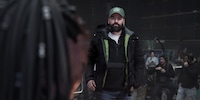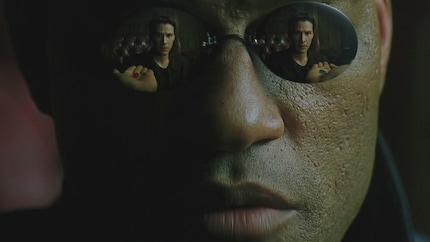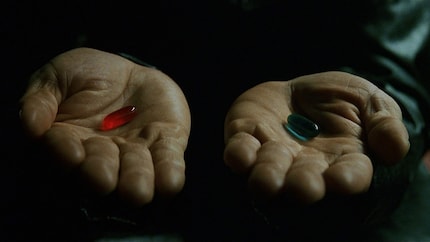
Background information
"Predator: Badlands" - In conversation with Dan Trachtenberg
by Luca Fontana

From the red pill to the fake steak, few other movies question our comfort zone as blatantly as The Matrix. Now it’s returning to the IMAX screen in full force.
Silence. Aside from the wind. A shot rings out. Another. Then another. Time slows down. The camera begins circling. And suddenly we see it, the impossible: this person isn’t running, isn’t jumping. No, he’s bending in the air at an inhuman angle. Back arched, arms outstretched, the floor only centimetres away. Bullets fly past him, elegant and deadly at the same time. But: they all miss.
He dodges them all.
It’s at this moment we know: the rules of this world can be bent. What seems like physics is really just code. And reality for you may not be reality at all. Maybe it’s… the Matrix.
Unfortunately, some rules are also negotiable outside of the movie. For example, when considering which movie will be shown next in IMAX. In our big vote a month ago, you voted for Inception. We’d have loved to show it, but no Nolan films are currently being released for IMAX. Same goes for runner-up The Dark Knight. So, it’s down to number three – The Matrix.
According to Warner Bros., it’s the studio’s first title ever to undergo the IMAX digital remastering (DMR) process. In other words, every frame has been optimised to look even more impressive on the biggest screen. It’ll be shown on Sunday, 21 September in all Pathé IMAX cinemas in Switzerland, in the original language. As always, in cooperation with The Ones We Love and Pathé Switzerland.
But this text isn’t intended to be a mere reminder. It’s an invitation to question your reality. So sit back, put Don Davis’ iconic movie soundtrack on in the background, and let yourself fall into the deepest depths of the rabbit hole.
Caution: here be spoilers.
«The Matrix is everywhere. It is all around us. Even now, in this very room. You can see it when you look out your window or when you turn on your television. You can feel it when you go to work… when you go to church… when you pay your taxes. It is the world that has been pulled over your eyes to blind you from the truth.»
I still remember exactly how Morpheus’ words shook me for the first time. I was maybe 14 or 15. Old enough to know that something is wrong with this world, but too young to understand what exactly. And then this cinematic window opens up, showing me I’m not the only one who has this feeling.
This feeling that everything is somehow… wrong.
Don’t you feel it too? That you’re moving through a life that someone else has set up for you? Get up, work, sleep. Consume, function, stay quiet. Commercialisation here, polarising feeds there. Just keep smiling. But deep down, I feel it: there has to be more.

The Matrix hits just this nerve. Then as now. And that just might be the film’s greatest secret: it doesn’t show us an alien, detached future. It shows us our present. And not just 1999, when the film was released. Even today, the Matrix is still relevant. Just from a different perspective.
The idea that we live in a system that makes us believe we’re free, while it’s long since decided our lives for us, isn’t fiction. It’s everyday life. We’re tracked, measured and filtered. As transparent humans, sorted into cohorts, target groups and purchasing power classes. Our interests are observed, amplified, manipulated – by algorithms that don’t know who we are, but predict exactly what we will click on next.
I mean, more than ever, our world has become a simulation of stimuli, recommendations and supposed choices, hasn’t it? It tells us which movie is relevant for us, which opinion we should read, even which relationship we could enter into if we rely on the relevant apps. Everything is tailored to us, but within a system we don’t control.
Freedom that increasingly feels like a subscription model: 9.90 a month, cancellable at any time – but only if we can find the small print.
But waking up from this simulation isn’t romantic. No sunrise, no warm moment of clarity. At least not in The Matrix. Waking up feels cold instead. Painful. You lose everything that’s supported you so far. Friends, family, everyday life – the dream turns out to be a mere facade.
Neo doesn’t fall gently from his dream. He’s ripped out. Naked. Weak. Connected to tubes that keep him alive – or rather: functioning. The truth isn’t a gift, it’s an affront.
Perhaps this moment hits us so hard because Neo himself is almost empty – a character without a big ego, without an overloaded backstory. We can project ourselves onto him. In his gaze, we see what we’d feel ourselves. His fear is our fear. We share in his confusion. And his first breath in the real world feels as if it were our own.
It’s precisely why the movie’s still effective today: it doesn’t sell us the illusion that waking up is easy. It shows us that it takes courage to swap the familiar lie for an uncomfortable truth. A decision we could make all the time on a small scale, but fail to make far too often.
No one embodies this better than Cypher. The man who’s already on the outside – who knows the truth – and still wishes to return to the illusion. He sits in a Matrix restaurant, a perfectly cooked steak on his plate. He knows it’s not real. That every bite is just an electrical impulse his brain interprets as pleasure. And yet, he says: «Ignorance is bliss.»
This is precisely why The Matrix has remained so incredibly relevant. Because we all know this decision. We’ve all seen our red pill – and ignored it. We didn’t have that uncomfortable conversation, didn’t leave our secure job. We didn’t think the truth through to the end because it would’ve demanded something of us that we were afraid of.
Sure, we aren’t living in a post-apocalyptic desert in 2025 (yet). Regardless, red pills are constantly in front of our noses. They just look different. Some of these red pills are an article that we know challenges our opinion, but we click away anyway because it’s inconvenient. Or a hint that the Insta algorithm doesn’t inform us, but conditions us, and we keep scrolling anyway because it feels good.
Or the realisation that our comfort zone – our bubble – isn’t the truth, but a truth.

These are the small choices that make The Matrix so timeless. They don’t take place in the distant future, but in the here and now. We don’t encounter them as science fiction, but in every conversation, every feed, every «maybe later». And just like in the movie, no one will give you the red pill. It just sits there.
You have to take it yourself.
The only question: do you really want to know how deep the rabbit hole goes? I know I want to. Because every gaze into the abyss is also a look into the truth – no matter how uncomfortable it is. And perhaps that’s exactly what makes The Matrix so immortal: not the effects, not the sunglasses, not the bullet time or kung fu moves. But rather the reminder that we always have a choice.
I write about technology as if it were cinema, and about films as if they were real life. Between bits and blockbusters, I’m after stories that move people, not just generate clicks. And yes – sometimes I listen to film scores louder than I probably should.
Interesting facts about products, behind-the-scenes looks at manufacturers and deep-dives on interesting people.
Show all
Background information
by Luca Fontana

Background information
by Patrick Vogt

Background information
by Philipp Rüegg